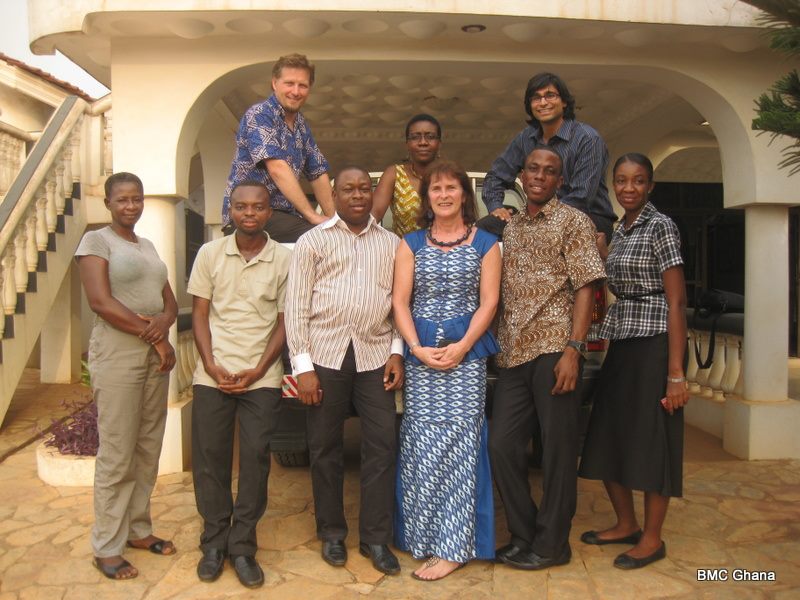
Education and the West African neighborhood
With immense excitement and limited experience on the continent, I mentally prepared to commence a new chapter in my professional life as the flight from Frankfurt arrived at Kotoka International Airport. I was fairly confident after the pre departure gender relations and inter cultural leadership training provided by CECI in Montreal. It complemented my previous employment and academic experiences in Middle East, Europe, and the United States. In short, I was ready to offer everything I had to the local partner and ready to experience everything Ghana had to offer.
West Africa has a myriad of issues that range from abject poverty in rural communities across Burkina Faso to civil and military unrest in Mali to rampant corruption in Cote D’Ivoire and Nigeria. A miniscule version of these issues can be felt across Ghana and in the communities bordering closest to them. It is therefore important to understand the broader context in which life in Ghana is conducted.
Ghana is an Anglophone country (with an additional 80+ local languages) bordering Francophone states of Togo, Burkina Faso, and Cote d’Ivoire. The Francophone currency union of West African states (CFA) also economically separates it from its neighborhood. Ghana has seen exponential growth of its major cities and industries in the past two decades. I would go as far as to say that within the past decade, Accra has surpassed Abidjan (the Paris of West Africa) in terms of development, prestige and status. Malls, highways, and new buildings are springing up everywhere. This push forward is due to many factors, one of which is the reclassification of Ghana as having graduated from the UN group classified as ‘Least Developed Country’ (LDC). This has contributed substantially to the increase in official development assistance (ODA) that Ghana receives annually. The upsurge in funding contributes to the capacity building initiatives across the country that inevitably help bolster economic output, trade, and create opportunities for all Ghanaians.
Ghana and Ghanaians often relate themselves to the much larger regional neighborhood powerhouse - Nigeria. Nigerian students travel visa free to from Lagos to Accra and enroll in Ghanaian post secondary institutes as part of the Economic Community of West African States (ECOWAS) union. Nigerian cultural output in the form of Nollywood can also be seen playing in buses and television screens dotted across Ghana in ‘chop bars’ and ‘tro tro’ stations. In addition, Ghana’s status as an up and coming brother of Nigeria has further been reinforced since the 2007 discovery of off shore crude oil. The fact that Ghanaians look at the only other country with English as the lingua franca is significant in formulating policies that resonate with Ghanaians and will later prove to be useful in my policy work.
Despite the overwhelming nature of the realization that “there is so much work that needs to be done!”, I found Ghanaians to be extremely positive and enthusiastic about the country’s future and place in the world. It is with this very desire that my co-workers at the Ghana National Education Campaign Coalition (GNECC) worked towards the primary goal of accessible, affordable and equitable education for all. On the surface this may seem like a straightforward task, however upon closer inspection one begins to understand the underlying institutional, cultural, and societal inertias present. My work focused on creating a communications strategy to better advocate for inclusive education policies. Some of the policy issues my daily work touched upon are the inclusion of women and girls, gender-neutral curriculums, support to rural communities, educational courses for adults, and special education curriculums for those with learning and physical disabilities.
First six years of primary-school and three years of junior secondary-school constitute basic education in Ghana. These levels are also compulsory and free for every Ghanaian child of school-going age. This education policy has been in place since 1987 and is starkly progressive when compared to its neighbors – something Ghanaians are proud of. Over the years, primary school enrollment has been further boosted by the elimination of fees and the introduction of supportive social programs, which has seen the enrollment of students aged six to twelve attending school go up to 3.2 million or 90% of those eligible. This is no small achievement and deserves accolades on its own. However upon closer inspection, there are major policy problems that are evident. These included gender norms that are tilted away from women seeking education and employment, lack of education opportunities for non-school going aged citizens, no accessible services for those with physical and mental disabilities, poor rural access and lack of training of teachers. All these policy gaps needed to be addressed and communicated to non-governmental organizations (NGOs), civil society organizations (CSOs), citizens, and governments and were central to my day-to-day work.
As a policy wonk, I had proactively read up on Ghana’s issues of government service gaps in sectors such as education, energy, transportation, health, and human services. Lack of these services, especially Education in which I was going to be working, was of the greatest interest. Initially, I had no idea about the depth of the issues or how to make them resonate with everyday Ghanaians. Talking to people and understanding the cultural undercurrents helped me understand the everyday Ghanaian to be able to better communicate with them. This meant that in addition to the Canadian, American, and European education policy models, it was imperative that I also understand Nigerian and Ghanaian models. Ultimately my policy research and communications strategies all included significant West African elements that proved to be culturally nuanced. I would highly recommend such an approach to any expatriate professional working in region they are not necessarily familiar with.
 Me (Back Right) with Senior Program Officer, Gender Policy Officer, Organizational Change Consultant, Country Executive Director, Chief Financial Officer and support staff
Me (Back Right) with Senior Program Officer, Gender Policy Officer, Organizational Change Consultant, Country Executive Director, Chief Financial Officer and support staff
